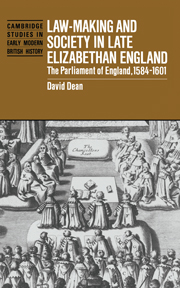Book contents
- Frontmatter
- Contents
- Acknowledgements
- Note to the reader
- List of abbreviations
- Introduction
- 1 Initiation and procedure
- 2 Supply and the general pardon
- 3 The crown and the state
- 4 Religion and the church
- 5 The commonweal
- 6 Law reform
- 7 Private legislation
- 8 Expiring laws continuance acts
- Epilogue: the Parliament of 1604
- Conclusion
- Index of acts
- Index of bills
- General index
6 - Law reform
Published online by Cambridge University Press: 14 September 2009
- Frontmatter
- Contents
- Acknowledgements
- Note to the reader
- List of abbreviations
- Introduction
- 1 Initiation and procedure
- 2 Supply and the general pardon
- 3 The crown and the state
- 4 Religion and the church
- 5 The commonweal
- 6 Law reform
- 7 Private legislation
- 8 Expiring laws continuance acts
- Epilogue: the Parliament of 1604
- Conclusion
- Index of acts
- Index of bills
- General index
Summary
In his study of the first seven sessions of the reign, Professor Elton found that bills reforming the law were relatively few in number. In contrast, almost a quarter of the bills initiated in the last six sessions of the reign sought some sort of legal reform; although these legislative attempts were as piecemeal as those earlier in the reign, there certainly seems to have been a change in public perceptions of the law. First of all, it is clear that privy councillors, royal legal officials and the judges were determined to initiate a full examination of the laws in force, possibly with a view to attempting consolidation if not codification. This was not new: attempts had been made by Sir Nicholas Bacon and proposed by at least one writer earlier in the reign, but, as we have seen, in 1589 the government took steps to secure a full enquiry into the laws in force. Moreover, royal officials regularly urged restraint on the making of new laws and the formalisation of the procedures for extending expiring laws may owe something to official desires to see some old and useless statutes removed from the books. This would undoubtedly have met with favour among some members of the lower house: between seventy-nine and ninety-one county MPs were also JPs when they sat in these sessions and complaints were made that JPs had too many statutes to enforce. On the other hand, the proportion of lawyers in the house doubled between the first and last parliaments of the reign and lawyers had a vested interest in keeping many laws on the books and resisting any reform which simplified the legal process.
- Type
- Chapter
- Information
- Law-Making and Society in Late Elizabethan EnglandThe Parliament of England, 1584–1601, pp. 188 - 216Publisher: Cambridge University PressPrint publication year: 1996

